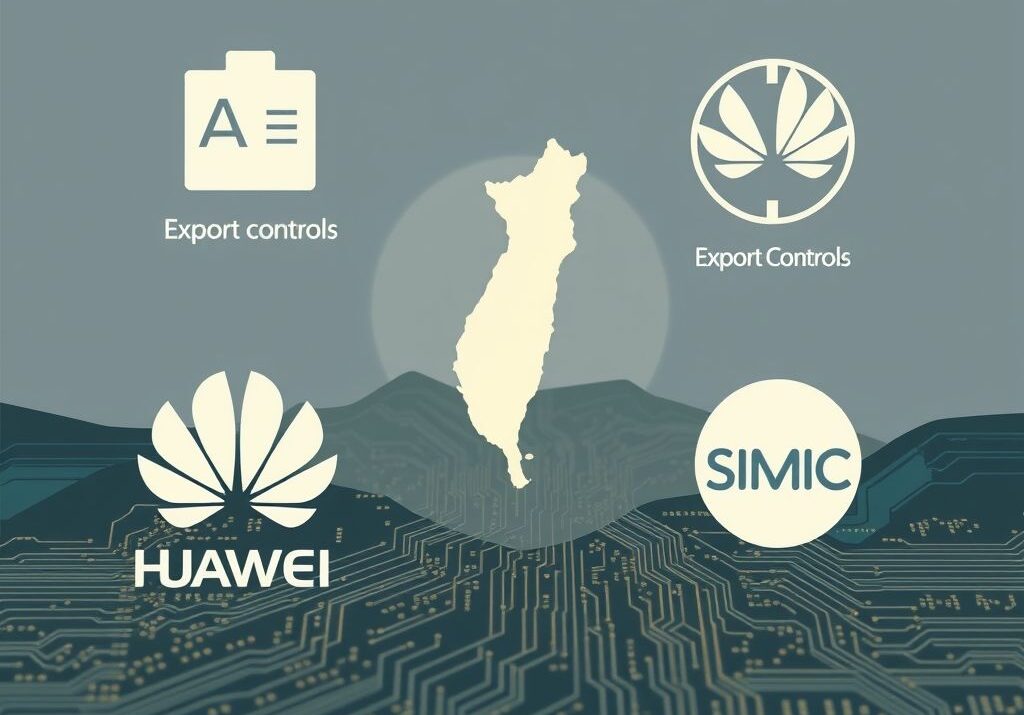Ever feel like you’re watching a high-stakes chess match unfold? That’s exactly the vibe I’m getting from the latest news out of Taiwan. It seems things just got a whole lot trickier for Chinese tech giants Huawei and SMIC. Word on the street (or rather, from TechCrunch) is Taiwan is implementing export controls specifically targeting these two, potentially throwing a wrench in their AI chip ambitions. https://techcrunch.com/2025/06/15/taiwan-places-export-controls-on-huawei-and-smic/
This isn’t just some minor bureaucratic hiccup. It’s a move with potentially significant implications for the global tech landscape. Why? Because Taiwan dominates the semiconductor manufacturing world, and access to their technology is crucial for anyone serious about AI. Think of it like trying to bake a cake without access to a key ingredient – good luck!
So, what’s the big deal? Well, access to advanced chips is basically the oxygen fueling the AI revolution. Huawei and SMIC, both key players in China’s tech scene, rely on Taiwanese technology to produce these essential components. These controls could seriously hamper their ability to develop and manufacture cutting-edge AI chips. And that has ripple effects.
The global chip shortage we saw during the pandemic highlighted just how vulnerable supply chains are. This move by Taiwan could further strain that system, potentially leading to higher prices and longer lead times for everyone – from smartphone manufacturers to automotive companies.
According to a report by Boston Consulting Group, China’s share of global semiconductor sales was around 9% in 2020, but their consumption was over 50%. This huge gap shows how much they depend on imports. https://www.bcg.com/publications/2021/taking-stock-of-the-china-semiconductor-industry These export controls directly target that reliance.
It’s not just about economics, either. There are significant geopolitical considerations at play here. These export controls underscore the delicate balance of power and the increasing competition in the tech sector.
Here are five key takeaways I’m chewing on:
- AI Development Slowdown: Huawei and SMIC might face real hurdles in developing and producing advanced AI chips, which could slow down China’s overall AI ambitions.
- Supply Chain Disruption: Expect potential disruptions to the global semiconductor supply chain, leading to higher costs and longer wait times for tech products.
- Geopolitical Tensions: This move underscores the growing tensions in the tech world and the strategic importance of semiconductor technology.
- Innovation Push: This could force Huawei and SMIC to accelerate their domestic chip development, potentially leading to unexpected innovations down the line.
- Diversification is Key: Companies worldwide need to think seriously about diversifying their supply chains to avoid being overly reliant on any single region.
This is a story that’s still unfolding. It will be interesting to see how Huawei and SMIC adapt, and how this impacts the wider tech world. I’ll be keeping a close eye on this one!
FAQs: Taiwan’s Export Controls on Huawei & SMIC
- What exactly are these export controls?
Taiwan is placing restrictions on the export of certain technologies and equipment that Huawei and SMIC need to manufacture advanced AI chips.
- Why is Taiwan implementing these controls?
While the official reasons might be couched in technical language, it’s widely believed to be related to national security concerns and aligning with broader international efforts to limit China’s access to sensitive technologies.
- How will this affect Huawei and SMIC?
It could significantly hamper their ability to produce cutting-edge AI chips, potentially slowing down their innovation and market competitiveness.
- Will this affect other companies besides Huawei and SMIC?
Potentially. Disruptions to the semiconductor supply chain could impact any company that relies on these chips, leading to price increases and longer lead times.
- What are the geopolitical implications of this move?
It highlights the growing tensions in the tech world and the strategic importance of semiconductor technology. It’s a move with geopolitical weight.
- Can Huawei and SMIC find alternative sources for these technologies?
It will be challenging. Taiwan is a dominant player in the semiconductor manufacturing industry, and finding suitable alternatives won’t be easy or quick.
- What impact will this have on AI development in China?
It could slow down AI development in China, at least in the short term, as Huawei and SMIC are key players in this space.
- Could this lead to a global chip war?
It’s unlikely to spark a full-blown “chip war,” but it certainly exacerbates existing tensions and could lead to further restrictions and counter-measures.
- What can companies do to mitigate the risks associated with these export controls?
Diversifying their supply chains and investing in alternative technologies are key strategies. Companies need to build resilience into their operations.
- Is this a permanent situation?
The situation is fluid and subject to change. Geopolitical factors and technological developments could influence future decisions regarding export controls.








